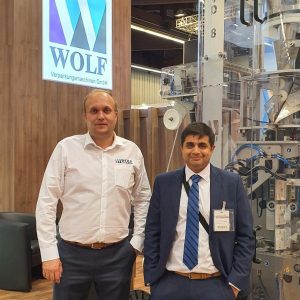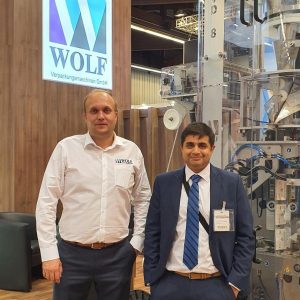On the sidelines of Fachpack 2019, Sebastian Wolf, managing director, Wolf discusses his company’s latest machines, plans for Gulfood and setting up of its Dubai operations on 3 November 2019 with Vikram Fotedar of Packaging MEA

Vikram Fotedar (VF): Everyone is talking about environment and the impact of plastics, isnít it?
Sebastian Wolf (SW): Environment consciousness and avoiding plastics is everywhere now. It’s more in Europe perhaps than in the MEA. Moving to paper-based packaging is going to be a huge trend here in Germany, which is understandable. But from my point of view, pure paper is not the same like plastic material because it doesn’t have the barrier to keep the product in it for a long shelf life. It might work for certain products, but not for all. For instance, at Fachpack we are showing the Doy pack machine and under the Doy pack machine we run a film from Jindal, which is 100% recyclable film. It’s OPP but it is still recyclable. So, from my point of view, the right way to go is not getting rid of plastics but making it 100% recyclable.
VF: How is running this material on your current machine different compared to running a laminate which has polyester and polyethylene?
SW: No impact at all. It’s running exactly the same way without any performance compromise.
VF: Would you like to share something with my readers in the Middle East about the new initiatives that Wolf is launching?
SW: Yes, a very interesting thing as Gulfood Manufacturing is coming up. On 3rd November 2019, we will be officially opening Wolf Packaging Middle East in Dubai Silicon Oasis. There we will have a 200 sqm demo room, which we will call the Experience Centre. We will host machines from our factory from Germany as well as from our factory in China to demonstrate to our customers, to train our customers and to invite them to test their products on the machine before they invest. Besides this we will have a team of 6 service engineers to service the Middle East region, out of Dubai. We will have a spare parts storage there for faster delivery of spare parts.
VF: This shows a lot of commitment towards the Middle East region. How well is Wolf prepared from an Industry 4.0 perspective and automation in general?
SW: Industry 4.0 is being discussed from a long time. I am not yet 100% convinced about it because, if you want to have a full packing line from the processing to the primary packaging, to the distribution, to tracking it – there are so many touch points. If you talk to a company that manufactures everything from the processing to the palletising, it might be possible but how many companies in the world do that. Not many. So, you will always need to have one or maybe two machines from this company and then combine it with other companies and that would involve all those companies to go along with an equal way of programming the whole machine. There is the PML, a certain standard of how a machine should be programmed. But there are manufacturers, which use PLC based control while other companies use industrial PC. And linking industrial PC and Pack ML is the next challenge. So, it sounds all nice but I think we are still not there yet.
On 3rd November 2019, we will be officially opening Wolf Packaging Middle East in Dubai Silicon Oasis.
Sebastian Wolf,
Managing Director, Wolf Verpackungsmaschinen GmbH
VF: Another interesting question I have is about producing stand-up pouches on a vertical form, fill, seal machine. So traditionally this was manufactured as a preformed pouch and now you have proposed a solution, manufacturing this in a vertical form fill seal machine. How readily is this being adopted by the industry?
SW: This came as a pre-made pouch. Then it went on to a horizontal machine to make it from a roll which was dominant for many years and it’s still dominant today. But horizontal form filling machine in order to make a Doy bag with a zip lock requires a footprint of around 6-7 mtrs by 1.5 to 2 mtrs. It runs about 60 packs per minute and it costs around Euros 400,000. In comparison to a vertical machine it stands on about 2 sq mtrs. It can run up to 110 bags per min and it costs just Euros 150,000. You see what the difference is. Due to these three factors – price, space and speed, there are companies which are changing to vertical machine, because in the space used by a horizontal machine that brings 40 packs per min, you can put two or three for the same investment for horizontal machine and you have three times the output. The quality of such a bag is not identical compared to premade or done on a horizontal, but if you consider all these factors a lot of people are thinking that the bag might not be 100% but 98% but they go for it because of the speed, cost and space advantage.
VF: Between formats, when you compare a quad seal or a centre seal pack to a stand-up pack, where do you see the market drifting towards, since now everything can be done on a vertical FFS?
SW: For us as a vertical machine manufacturer, Doy style is booming everywhere. It’s in Europe, Middle East, South America, and Asia. Doy pack is the bag shape everybody wants to produce at the moment, which is good for us because not everybody has the money – half a million Euro that is, to invest in ahorizontal machine.
VF: Is there anything else that you would like to share?
SW: I just mentioned about Doy bag made on a vertical machine. Such a machine maybe on display at our stand in Gulfood Manufacturing, after which it will be moved to the demo centre in Silicon Oasis and remain there for the next 12 months.
Whether our customers utilize the bag packaging as the primary or secondary packaging – WOLF always manufacturers, configures and provides the best suitable vertical and horizontal packaging machines, dosing systems and complementary components.



